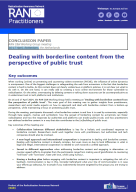Details
- Publication date
- 19 July 2024
- Author
- Directorate-General for Migration and Home Affairs
- Country
- Netherlands
- RAN Publications Topic
- Internet and radicalisation
Description
When working (online) on preventing and countering violent extremism (P/CVE), the influence of online dynamics is omnipresent. One of the biggest challenges in safeguarding the web from extremism is the fact that borderline content is hard to tackle. As this content does not clearly violate laws or platform policies, it is not clear cut what to do with it. On the one hand, it can really add to creating a toxic online environment for those vulnerable to radicalisation. On the other, overreacting by deleting content or taking down accounts can be counterproductive as it undermines trust in tech platforms and institutions.
On 16 and 17 April 2024, the RAN C&N Working Group held a meeting on ‘Dealing with borderline content from the perspective of public trust’. The main goal of this meeting was to gather insights from practitioners, researchers and social media experts on how to approach and deal with borderline content from a bottom-up perspective, while maintaining a focus on protecting public trust.
During the meeting, participants discussed: what borderline content is and how it is used by extremists, especially through hate speech, memes and symbolism; how the spread of borderline content by extremists can foster radicalisation and how the responses by authorities and platforms can erode (public) trust; and how practitioners can address borderline content in a way that also contributes to the (re)building of public trust.
Key outcomes of the meeting are:
- Collaboration between different stakeholders is key for a holistic and coordinated response to borderline content. Researchers could work together more with practitioners, but authorities and tech companies should also be involved.
- A new legal approach and international cooperation is imperative in dealing with borderline content. Dealing with borderline content is already complex, but even more so due to local differences in what is legal and illegal. International cooperation is needed to work towards a unified approach.
- Invest in different approaches when addressing borderline content and engaging in alternative- or counter-speech efforts. Examples from the participants range from making use of gamification to countering “troll bots” with “love bots”, hate with love, while using humour.
- Having a backup plan before engaging with borderline content is important in mitigating the risk of a backlash. Communication is key in this. Consider beforehand what your line of communication is in case your efforts go sideways, for example if you inadvertently become targeted by the groups you are trying to address.
- More attention should go to implementing security parameters to ensure safety of both moderators addressing borderline content as well as platforms themselves, for example to protect them against cyberattacks.
- While artificial intelligence (AI) offers opportunities to respond to borderline content (for example, in automated content moderation), a lot of limitations exist in the ability of AI tools to respond effectively. Therefore, it is recommended to always keep a human in the loop when using AI to respond to borderline content in a P/CVE context.
This paper first covers the highlights of the discussions and presentations that were given during the meeting, followed by an outline of the case study action plans that the participants worked on during the meeting. Then, the main conclusions and insights from the meeting are formulated in a “do’s and don’ts” overview as well as a list of general recommendations.

